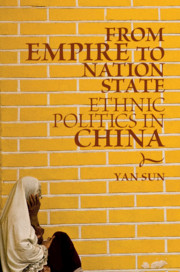Book contents
- From Empire to Nation State
- From Empire to Nation State
- Copyright page
- Dedication
- Contents
- Figures and Tables
- Acknowledgments
- Introduction What Is Destabilizing about China’s Ethnic Regions?
- 1 Changing Approaches to Identity
- 2 Changing Approaches to Ethnic Governance
- 3 Changing Approaches to Policy Instruments
- 4 The Rise of Identity Politics in Post-Mao China
- 5 Ethnic Autonomy and Its Discontents
- 6 Religious Revival and Its Discontents
- 7 Economic Modernization and Its Discontents
- 8 Educational Expansion and Its Discontents
- Conclusion From Empire to Nation State: Lessons and Reforms
- Bibliography
- Index
4 - The Rise of Identity Politics in Post-Mao China
Published online by Cambridge University Press: 07 September 2020
- From Empire to Nation State
- From Empire to Nation State
- Copyright page
- Dedication
- Contents
- Figures and Tables
- Acknowledgments
- Introduction What Is Destabilizing about China’s Ethnic Regions?
- 1 Changing Approaches to Identity
- 2 Changing Approaches to Ethnic Governance
- 3 Changing Approaches to Policy Instruments
- 4 The Rise of Identity Politics in Post-Mao China
- 5 Ethnic Autonomy and Its Discontents
- 6 Religious Revival and Its Discontents
- 7 Economic Modernization and Its Discontents
- 8 Educational Expansion and Its Discontents
- Conclusion From Empire to Nation State: Lessons and Reforms
- Bibliography
- Index
Summary
This chapter argues that the institutional dynamics of the autonomous system – centralization and ethnicization – have intensified in the reform era, fueling key sources of ethnic tensions in contemporary China. The driving force has been the decline of class universalism and the rise of identity politics. The chapter shows how these two developments were spurred by early post-Mao policies to redress the leftist excesses of the Mao era, including the “declassing” of minority policy, rehabilitation of former ethnic elites, exit of Han personnel, revival of religion, and accommodation of ethnic customs in law enforcement. These policies have affected the TAR and Xinjiang in particular because of the central government’s greater urgency and efforts to implement them in the two politically sensitive and centrifugal regions. Yet the very end of class universalism and the advent of identity politics have also made it harder for the central state to achieve its goal of better integration. Whereas class universalism was divisive intraethnically, pitting ethnic masses against small groups of ethnic aristocrats, identity politics is divisive interethnically, creating cleavages along ethnic lines.
- Type
- Chapter
- Information
- From Empire to Nation StateEthnic Politics in China, pp. 101 - 129Publisher: Cambridge University PressPrint publication year: 2020



